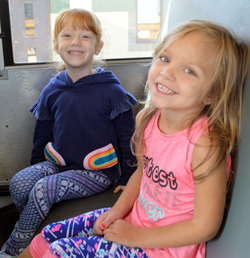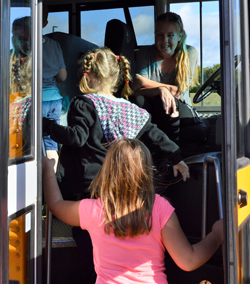Voice level at zero to one. Buses get very, very loud.
No backpacks in aisle. People will trip.
Your seat in the seat and your back on the back.
These bus rules aren’t just rules for the sake of having rules. Rather — learning about how to ride the school bus is one of the essentials to knowing how to “do school,” according to Ridgeview Elementary Principal Heather Guerra.
Positive Behavioral Interventions and Supports, known as PBIS, is a program that Sparta Area Schools, as well as many others, use to encourage positive behavior in all aspects of the school day.
“We work toward building school-wide consistent behaviors,” said Guerra. “We teach that there are expectations for them in hallways, lunchroom, restrooms and on the playground as well as in the classrooms. We are teaching kids how to be part of the Ridgeview community.”
Learning what is expected of them on the bus may be especially important, since adult responses vary more outside the school walls, and not all children ride the bus every day, she said. “Sometimes the adult on the bus doesn’t respond in the way students expect. They do an excellent job, but we can help if we prevent certain student behaviors – such as keeping hands to themselves and staying in their seats.”
Lessons Learned
At Ridgeview, all students are taught to focus on how to be safe, kind, respectful and responsible, said Jodi West, Kent School Services Network coordinator, who is part of the PBIS team for the school. (These coordinators support children and families in schools, help those who need special support, and focus on issues surrounding behavior and attendance.)
“The premise (of PBIS) is that good behavior can be taught, just like any academic area. We model, acknowledge and praise positive behavior in order to encourage a positive outcome,” said West. “We cannot assume that every child knows what behavior is expected on a school bus. This approach is prevention as opposed to punishment.”
West told the Ridgeview students that riding a bus is a privilege and that part of their job in being respectful is being kind to bus drivers.
“Thank you for the ride.” “Have a nice day.” “You did a very good job,” students said as they filed off the bus during the practice sessions.
Keeping personal items and hands and feet out of the aisle to promote safety is as important as making sure all of your things are gathered up and taken off the bus when leaving, she said.
“It is the bus driver’s job to keep moving, so it is important that you keep moving too, and get into your seat or off the bus when you are supposed to,” West said.
Nothing goes out of the window when they are open. “Not litter” and “Not even my arms,” said some of the first graders, who were more experienced in bus etiquette than their kindergartner friends.
“I ride ‘Butterfly’ (bus names are easier than numbers for the young children to remember). I rode all last year,” said first grader Wyatt Roberts. “I know how to do it.”
CONNECT












